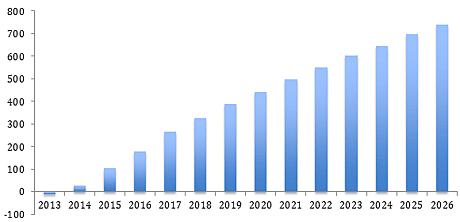
If you want to run an inter-city rail franchise in Britain one thing is abundantly clear – you need to be prepared to offer the government lots of money.
That’s what FirstGroup (FGP) has agreed to do. In return for running the West Coast rail franchise – which links London to places such as Birmingham, Manchester and Glasgow – for the next 13 years it has signed up to pay eye-watering amounts of cash to the Treasury.
How much? FirstGroup hasn’t told anyone yet. But from what I can deduce, the sums involved are big enough to make the shares pretty high risk.
West Coast is a good franchise at the right price
It’s not difficult to see why companies want to run rail franchises. They don’t require lots of capital investment – all the trains, track and stations are leased from other companies. If you can make a profit, it can provide decent, steady cash inflows.
A franchise like West Coast has seen revenues increase by over 10% a year for the last decade and has been a good source of profits for the operator, Virgin Rail. Throw in the fact that it has lots of spare capacity and you can see why some people think that it can keep growing.
But FirstGroup is paying a staggering amount of money
All FirstGroup has told people up to now is that the net present value (future payments converted into an equivalent amount of money today) of the sum, it will pay to the government is £5.5bn. The actual outlay will be much bigger than that. So I’m not surprised that FirstGroup doesn’t want to give the number.
West Coast payments to the government (£m, NPV)
Stagecoach (49% owner of Virgin Rail) has given us some numbers that can help here. It was the second highest bidder for the franchise. Its bid committed it to pay the government £8.6bn to run the franchise, or £4.8bn in net present value terms.
Based on FirstGroup’s £5.5bn and Virgin Rail’s numbers, my back-of-the-envelope calculation suggests that FirstGroup’s total cash promise to the government is around £9.85bn.
Given that newspaper reports in recent weeks were suggesting a winning bid might come in nearer £7bn – which itself was considered toppy – it’s no surprise that FirstGroup’s shares are getting hammered this morning.
The numbers don’t stack up
How is FirstGroup going to make the amount of money needed to pay the government?
It is betting that it can keep on growing the business. 40,000 new seats per day will be available from 2016. This and FirstGroup’s management expertise will hopefully see passenger numbers and revenues go up.
FirstGroup thinks that’s passenger numbers can grow by 5.8% per year and revenues by 10.4% for the next 13 years. That means they are going to grow faster during the next 13 years then they have during the last ten.
This is surely too optimistic. Besides trying to predict what revenues and costs will be over the next 13 years is virtually impossible.
The problem for FirstGroup shareholders is that the costs of getting the numbers wrong could be very big indeed.
Is this National Express all over again?
We think FirstGroup shareholders should be very worried. The payments to the government during the first years of the new franchise are not that big. West Coast should make a profit. It’s a few years out when things could get nasty.
It’s worth noting that last year West Coast Trains paid £167 million to the government. It should have paid £214 million, but it didn’t, because revenues did not meet forecasts – a recurring theme in some rail franchises.
We reckon that FirstGroup will have to make average annual payments of £740 million over the life of the franchise. In a weak UK economy, there’s good reason to think that it’s revenue forecasts won’t be met. This could mean that it may not be able to pay the government.
Think this can’t happen? Just look at the history of the inter-city East Coast franchise. The two previous operators, GNER and National Express, both had to give up the franchise because they couldn’t meet their promises.
The experience of National Express should be a stark warning to FirstGroup shareholders. National Express was a company with lots of debt that needed some extra income to get out of a hole. By bidding too much to run a rail franchise, the solvency of the whole company was put at risk. Shareholders had to stump up even more money to save it.
FirstGroup looks to be in a very similar situation today. It has lots of debt, and a quarter of its profits come from rail franchises that start to expire next year. It needs to replace this income stream. It’s just promised a lot of money to try and do this. There’s a risk that it could face the same fate as National Express.
Just remember, if FirstGroup has to hand the keys back on West Coast, it will have to give up all its other rail franchises as well – a cross default clause of rail franchising.
Four months ago, we tipped FirstGroup shares as a risky punt at 198p. With the share price now 20% higher, they look even riskier now. It’s time to sell.